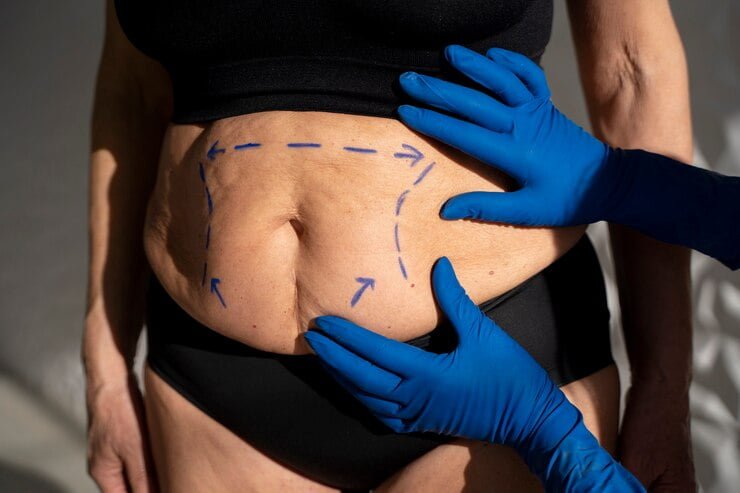Sleeve gastrectomy treatment, also known as gastric sleeve, is one of the most popular and successful laparoscopic bariatric surgeries available. A patient may expect to lose 50–60% of their extra weight during the first year following surgery. It is a more affordable alternative to gastric bypass, more successful than gastric bands or balloons, and has been shown to encourage long-term weight loss. Despite this, some patients have experienced weight gain after gastric sleeve surgery. Weight gain after gastric sleeve surgery is an issue that is challenging, particularly when the patient chose the treatment for weight loss in the first place. What causes weight gain following gastric sleeve surgery? And what can we do about it?
However, people might gain weight after gastric sleeve surgery. Most weight gain is short-term and shows in minor blips. For example, a patient who underwent a gastric sleeve and has fully recovered from the treatment may discover that they have gained two pounds in the past week. This is not something to be bothered about. But some patients report continued weight gain and increased calorie consumption after the procedure.
What Makes Weight Gain After a Gastric Sleeve?
Following bariatric surgery, it is common for patients to experience weight regain, as they continue to live in a body with a higher weight, and the capacity of either the individual or the surgery to manage every factor is minimal. Metabolic forces aimed at restoring lost weight can impact body fat in various additional ways.
There are some common problematic eating habits that follow weight gain.
Eating Under Stress
Many people struggle with overeating when they are worried or emotionally upset. Bariatric surgery can help lessen hunger and limit the quantity a person can eat at a time, but it does not tackle the real reasons why people choose food for comfort during difficult times. Dealing with stress eating involves more concerning mental wellness than simply changing food habits. If stress eating continues after surgery, you should get support from a mental health professional or counselor.
Extending of the stomach
The stomach pouch, commonly referred to as the redesigned stomach, can still expand to accommodate more food, even though both gastric bypass and gastric sleeve lower the total capacity of the stomach. The body adjusts to consuming larger portions. There is no relationship between obesity and stomach size in healthy stomachs. However, it can have long-term consequences if you have had stomach volume reduction surgery lately. Eat fewer portions overall and avoid drinking water with your meals. However, stick to the post-operative diet instructions and keep drinking water throughout the day.
Insufficient Physical Activity
One of the most effective ways for a bariatric patient to lose weight is to begin an exercise program. It was shown that bariatric patients who followed an exercise plan reduced more weight than those who did not and were able to keep it off for longer. If you are starting to regain weight again, then start doing exercise in your daily routine. Alternatively, if you’re currently exercising, consider adding more difficult workouts like HIIT or strength training to help with losing weight.
Reasons for regaining weight after surgery
Losing weight requires more than simply what we eat and how much we exercise. It includes anatomical, physiological, psychological, and behavioral factors that can all affect our ability to maintain a healthy weight. Addressing these difficulties carefully is important to successful weight management measures, including changes in how our bodies digest fat, psychological factors such as depression, and behavioral habits. Let’s look at some of these aspects in more detail.
Reasons for Regaining Weight | |
| Anatomical | This is a reference to the body’s and its components’ physical composition and arrangement. The size, shape, and arrangement of organs, as well as any irregularities or differences in these structures can all be considered anatomical factors. |
| Physiological | This has to do with the procedures and operations that the body goes through to keep itself healthy and alive. Physiological aspects include the interaction of several systems in the body, including hormone control, metabolism, digestion, and circulation. |
| Psychological | This includes mental operations and actions associated with ideas, feelings, and actions. Emotional reactions to different stimuli, cognitive functions like perception and decision-making, and mood disorders like anxiety or depression are examples of psychological factors. |
| Behavioural | These are behaviours or behavioral patterns that people shows, frequently influenced by physiological and psychological factors. Lifestyle habits such as physical activity, eating habits, sleep patterns, techniques for reducing stress, and behaviors that are addictive can all be considered behavioural factors. |
After bariatric surgery, weight gain is common since the patient still lives in an environment that promotes obesity and there is minimal control over external factors. Metabolic requires to restore lost weight also apply to body fat.
Preventive Measures and Support
To make sure your weight loss journey is not just successful but also durable, it’s important to have a support system and follow certain preventive measures. These steps are designed to help you stay on track and maintain your progress over time, ensuring a healthier and happier future.
Regular Follow-ups
Your healthcare providers are your partners in this journey. By scheduling regular follow-up appointments, you not only stay accountable but also receive valuable guidance and support to navigate any challenges you may face along the way.
Healthy Eating Habits
Embracing healthy eating habits isn’t just about following a diet; it’s about nourishing your body and mind. Focus on balanced meals, portion control, and mindful eating to create a positive relationship with food.
Physical Activity
Movement is medicine for both body and soul. Engage in physical activities that you enjoy, whether it’s a daily walk, yoga session, or dance class. Regular exercise not only helps in weight management but also boosts your mood and energy levels.
Seeking Support
You don’t have to go through this journey alone. Reach out to nutritionists, dietitians, and support groups who can provide ongoing guidance, motivation, and a sense of community. Sharing experiences and tips with others can be truly motivating.
Emotional Well-being
Your emotional and psychological well-being play a significant role in your overall health. Address any emotional or psychological factors that may impact your eating behaviors, such as stress, anxiety, or self-esteem issues. Therapy, mindfulness practices, and self-care routines can be beneficial in nurturing your mental health.
While the path to weight management after gastric sleeve surgery may have its challenges, it’s also filled with opportunities for growth and transformation. By committing to lifelong lifestyle changes, embracing support from professionals and peers, and prioritizing your physical and emotional well-being, you can not only achieve but also sustain successful weight management outcomes. TurkeyObesity is here to be your guide and ally in this journey, offering personalized consultations, comprehensive support, and a nurturing environment for you to thrive. Together, let’s make your weight management goals a reality and celebrate every step of your progress. Reach out to us for the personalized care and support you deserve.




